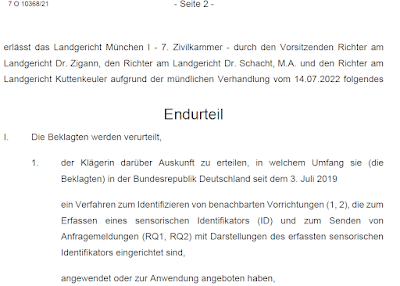A few hours ago, the Munich I Regional Court's Seventh Civil Chamber (Presiding Judge: Dr. Matthias Zigann) announced its decision in K.Mizra v. Niantic: the wildly popular Pokémon GO mobile game infringes EP2433414, a patent on "servers for device identification services" that resulted from the research efforts of a reputable and sizeable Dutch organization named TNO (Nederlandse Organisatie voor Toegepast Natuurwetenschappelijk Onderzoe; Netherlands Organisation for Applied Scientific Research). The case numbers are 7 O 13977/21 and 7 O 10368/21. The defendants are Niantic entities in the U.S., UK, and Germany.
Thus far, US-based licensing firm K.Mizra hasn't sought an injunction--only a finding that is entitled to a damages award--but it could do so anytime. For the Pokémon GO community I hope this can be avoided, but as Juve Patent explained yesterday, "nothing has changed" about Germany's automatic injunction rule in patent infringement cases.
The court's press office has thankfully provided me with an anonymized version of the dispositive part of the ruling (the order in a narrow sense). Here's a screenshot of a key passage (click on the image to enlarge):
This comes as no surprise. At the end of the July 14 trial, Judge Dr. Zigann strongly encouraged Niantic--a Google/Nintendo joint venture, with Google's technology being particularly at issue in this case--to negotiate a settlement. Niantic has the right to appeal the decision to the Munich Higher Regional Court, but K.Mizra's infringement argument is rather strong (based on what was discussed at the trial), and the prior art cited by Niantic doesn't really seem to come close to the patented invention.
While it's unclear how protracted this litigation will become or whether it may even extend to other jurisdictions where members of this patent family have been registered (and which would take note of the Munich court's findings), K.Mizra is also asserting a patent against Samsung in Dusseldorf, targeting what is clearly an Android operating system functionality. That patent, too, was originally obtained by TNO. The Samsung case will go to trial in less than a year.
This is another significant win for the Wildanger firm. K.Mizra's winning lead counsel is Dr. Alexander Reetz, who handled matters in a calm but strategic and persuasive way. It was easy to follow his clearly articulated arguments. K.Mizra's lead patent attorney is Dr. Thomas Hell of Bosch Jehle). He and Dr. Reetz played and won as a team. I guess we'll hear about their work more often in the future.
Niantic is being represented by Quinn Emanuel's Dr. Marcus Grosch, who recently got mixed press, one of the reasons for which is that QE is the only patent litigation firm in Germany never to bring patent attorneys along to hearings and trials. That said, I wouldn't attribute QE's defeat in this case to its ironclad rule concerning patent attorneys: K.Mizra seems to have a pretty clear case, and this plaintiff's outside legal team apparently did everything right, so it may just have been impossible to defend Niantic here. But just last month QE also lost an appeal in a Netflix case. And it was two years ago to the day that the first of four German patent injunctions came down on QE client Daimler (the other three followed over the course of only 11 weeks). For a firm that states on its website that it has won 86% of all trials and arbitrations (not long ago they even claimed a 91% rate of success), the German patent litigation track record may very well be substandard. However, Wildanger may really have a hit rate at that level, or at least that's what I've recently seen in the cases I follow (examples: 1, 2).
